
Bulletin-164 — Authors
On This Page
A group of experts was assembled as the Climate and Water Science Advisory Panel, to create Bulletin 164 — Climate Change in New Mexico Over the Next 50 Years: Impacts on Water Resources. These authors are listed below in alphabetical order:
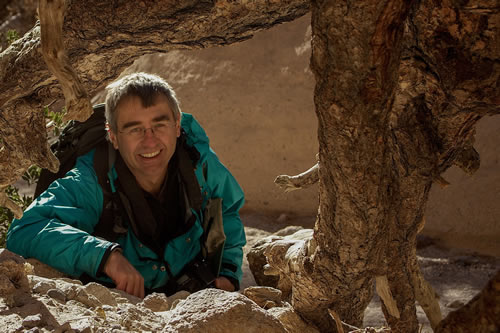
Craig D. Allen
Adjunct Professor, UNM: Geography and Environmental Studies
craig_allen@usgs.gov
Craig D. Allen is an adjunct professor in the Department of Geography and Environmental Studies at the University of New Mexico. He is recently retired after 35 years as a research ecologist for the U.S. Department of Interior (U.S. Geological Survey [USGS] & National Park Service [NPS]) and founding leader of the USGS New Mexico Landscapes Field Station, based at Bandelier National Monument in the Jemez Mountains of northern New Mexico, where he raised a family and has conducted ecological research since 1981, starting with his M.S. & Ph.D. thesis projects. Craig conducts place-based, long-term research on the ecology and environmental history of southwestern US landscapes, and the responses of western US mountain ecosystems and forests globally to climate change, with many international collaborations; he also provides technical support in the areas of ecosystem management and restoration to diverse land management agencies, Native American tribes, and governmental and non-governmental organizations in the region. Recent and ongoing research activities, involving many colleagues and collaborators, include: integrated understanding of climate-induced tree mortality and forest die-off, including determination of global patterns and trends; development of ecological and fire histories in the Southwest US; ecological effects of recent fires on Southwestern landscapes; linked ecological, runoff, and erosion processes in semi-arid watersheds; ecological restoration of Southwestern forests and woodlands; and developing long-term ecological monitoring networks across landscape gradients in the Jemez Mountains.
Craig received B.S. and M.S. degrees in Geography from the University of Wisconsin-Madison, and a Ph.D. in Wildland Resource Science (forest & landscape ecology, conservation biology) from the University of California-Berkeley. He is an elected fellow of the Ecological Society of America (ESA) and also the American Association for the Advancement of Science (AAAS). For the past three years (2018-2020), Craig has been named by the Web of Science group to the world’s “Highly Cited Researchers” list, in 2020 as one of 202 scientists recognized globally in the research category of “Environment/Ecology”, representing 0.1% of the world’s environmental researchers; https://recognition.webofsciencegroup.com/awards/highly-cited/2020/. For publications see his Google Scholar page listing at: http://scholar.google.com/citations?user=lSzjnAwAAAAJ&hl=en
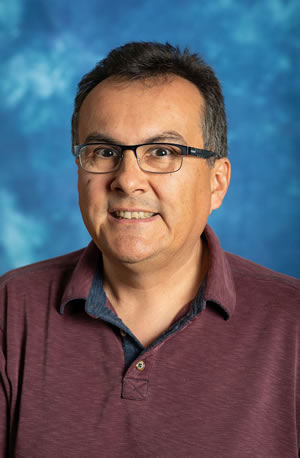
David DuBois
State Climatologist for New Mexico, Director of the New Mexico Climate Center, Associate Professor: NMSU Plant & Environmental Sciences
dwdubois@nmsu.edu NMSU webpage
Dr. David DuBois is the State Climatologist for New Mexico, Director of the New Mexico Climate Center, and Associate College Professor at New Mexico State University (NMSU). At NMSU he teaches courses in climate change and air quality in the Department of Plant and Environmental Sciences. He provides climate and climate change information and education to policy makers, the agricultural community, industry, educators, students, and the public. In addition, he also gives numerous talks and holds workshops every year on topics covering climate, drought, air quality, and climate change. Dr. DuBois trains students at NMSU and maintains an active research program in air quality and climate. He holds a BA in Physics from Rutgers University, MS in Physics from NMSU, and a Ph.D. in Atmospheric Science from the University of Nevada Reno.
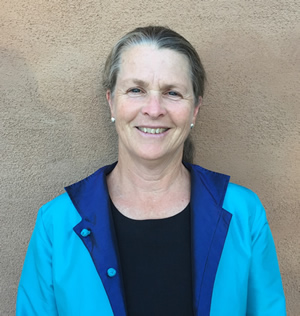
Nelia W. Dunbar
Director & State Geologist, New Mexico Bureau of Geology & Mineral Resources
Nelia.Dunbar@nmt.edu NMBGMR webpage
As director of the New Mexico Bureau of Geology and Mineral Resources, Nelia is responsible for overseeing the research and service activities of the state geological survey. She works closely with many of the staff to keep current on their activities, and to provide advice when needed. She reports to the president of New Mexico Tech, who she keeps informed about bureau activities and events. Nelia represents the bureau at the state legislature, to other state agencies, and at national meetings. She also serves as the New Mexico representative to the American Association of State Geologists organization. Her scientific background is in geochemistry, mainly in the study of volcanic rocks, and she received funding for, and previously directed the electron microprobe laboratory, where she now acts as advisor. Nelia is an adjunct faculty member in the Earth and Environmental Science department at New Mexico Tech, where she has taught classes and advised graduate students.
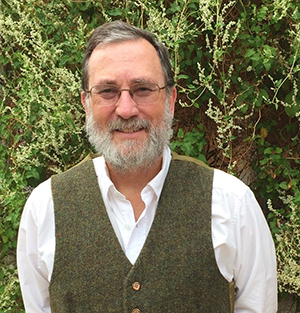
David S. Gutzler
Professor, UNM: Earth and Planetary Sciences
gutzler@unm.edu UNM webpage
- Gutzler's research interests include climatology, meteorology, interactions between Earth's atmosphere and its hydrosphere, biosphere, cryosphere and lithosphere, predictability and variability of weather and climate and extreme weather events
- Additional research areas include southwestern U.S. monsoon season, long-term climate change projections, wildfires and summer precipitiation, and weather and climate fluctuations affecting southwestern North America
- Teaches meteorology and climatology courses at UNM
- Earned his Ph.D. from Massachusetts Institute of Technology (MIT) in 1986
Additional areas of interest
Climatology, meteorology, interactions between Earth's atmosphere and its hydrosphere, biosphere, cryosphere and lithosphere, and predictability of weather and climate.

Michael D. Harvey
Fluvial Geomorphologist, TetraTech, Inc.
mike.harvey@tetratech.com Dr. Harvey, based in TetraTech's Albuquerque office, has over 50 years of experience applying the principles of fluvial geomorphology to flood and sediment management, river navigation, hillslope and channel stability, mined-land reclamation and environmental restoration projects for Federal, State and Local agencies throughout the U.S. and Internationally (New Zealand, Australia, Indonesia, Peru, Chile, Papua New Guinea, India, Pakistan).
He has worked on river systems in diverse climatic settings ranging from the Arctic to the Tropics. In the last 20 years he has completed projects on all of New Mexico's major river systems for State (NMISC, MRGCD, AMAFCA, SSCFA) and Federal (USACE, USBOR and USFWS) agencies.
Dr. Harvey has a B.S. Agricultural Engineering (1969) and an M.S. Hydrology (1973) from the University of Canterbury, New Zealand and a Ph.D. in Fluvial Geomorphology (1980) from Colorado State University.
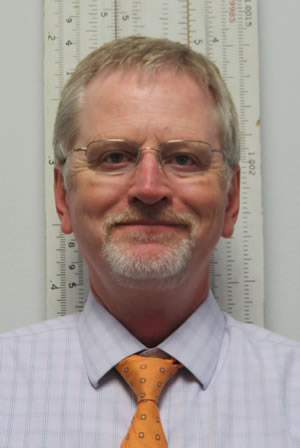
J. Phillip King
Associate Professor & Department Head, NMSU: Civil Engineering Department
jpking@nmsu.edu NMSU webpage
Dr. King is a Professor and Associate Department Head in the Civil Engineering Department at New Mexico State University, where he has been since 1990. He specializes in water resources engineering, and his research has included irrigation, hydrology, and water quality studies of the Rio Grande. He has worked as a consultant with Elephant Butte Irrigation District since 1993 in the development of flow monitoring systems and organizational infrastructure to allow the District to manage its water supply more effectively, and he provides technical support for dispute resolution on area water issues. Dr. King has worked with the State of New Mexico, irrigators, municipalities, Native American tribes, the World Wildlife Fund, and several international entities to develop new and innovative approaches to water management. In 2009, Dr. King was awarded a Science and Technology Policy Fellowship from the American Association for the Advancement of Science posted at the National Science Foundation. He chaired the boards of both the Leasburg Mutual Domestic Water Consumers Association and the Doña Ana Soil and Water Conservation District, and Governor Richardson appointed him to the New Mexico Soil and Water Conservation Commission. He served as a Peace Corps volunteer in Malawi, Africa. Dr. King has Ph.D. and M.S. degrees in Agricultural Engineering from Colorado State University, a B.S. in Civil Engineering is from the University of California, Berkeley, and an M.B.A. from New Mexico State University. He is a registered Professional Engineer in New Mexico.
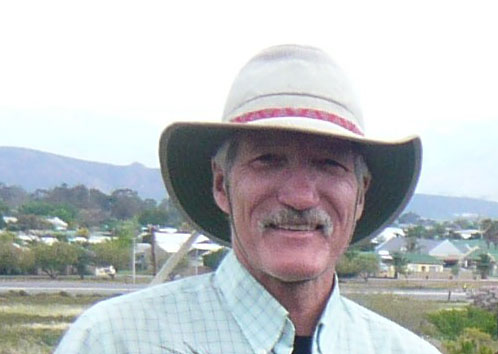
Leslie D. McFadden
Professor Emeritus, UNM: Earth and Planetary Sciences
lmcfadnm@unm.edu UNM webpage
Leslie McFadden, Ph.D., is a Professor Emeritus in the Department of Earth & Planetary Sciences at the University of New Mexico and served as a faculty member for 35 years before retiring. Dr. McFadden served as Chairperson of the Department for 2 four-year terms. He also served as Chairman of the Quaternary Geology and Geomorphology Division of the Geological Society of America and as a Councilor on the American Quaternary Association Council representing “Terrestrial Geomorphology”. He has an A.B. degree in Anthropology and Step Program in Geology from Stanford University, and M.S. and Ph.D. degrees from the University of Arizona.
The main focus of Dr. McFadden’s research concerns the study of soil morphology and soil genesis, and the application of these studies to research in landscape evolution, environmental (seismic, volcanic, mixed waste) hazards, paleoclimate, archeology, ecology and more generally, the “Critical Zone”. His research has helped to establish new models of desert soil and pavement development, to improve the understanding of key mechanisms of physical weathering in drylands, and to appreciate the impacts of dust entrapment and soil development on the geomorphology of dryland hillslopes.
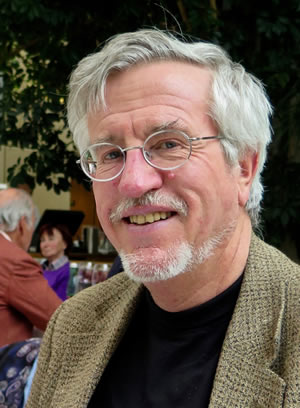
Fred M. Phillips
Professor Emeritus, NMT: Hydrology
fred.phillips@nmt.edu NMT webpage
Fred Phillips is Professor Emeritus of Hydrology at New Mexico Institute of Mining & Technology (New Mexico Tech). He received an undergraduate degree in Earth Science from the University of California at Santa Cruz in 1976. He completed MS and Ph.D. degrees in Hydrology at the University of Arizona before taking a faculty position at New Mexico Tech in 1981. He has been on the faculty of the Earth & Environmental Science Department there since that time. He has taught both undergraduate and graduate courses in a wide range of earth-science topics, but especially groundwater hydrology, geochemistry of natural waters, and global climate change. His research areas include methods for determining the residence time (length of time spent underground) of groundwater, the ways in which surface-water flows arrive at streams, how water availability and vegetation type affect each other, ways of determining the age of features on the land surface, and geological records of changes in the climate and the hydrological cycle. He has 227 publications, including 157 in peer-reviewed journals and books. He is the first author of “Reining in the Rio Grande: People, Land, and Water”, a popular book on the environmental history of the Rio Grande in New Mexico and the challenges it faces today. He is a Fellow of the American Geophysical Union, the Geological Society of America, and the American Association for the Advancement of Science. He has received the O.E. Meinzer Award from the Hydrogeology Division of the Geological Society of America (GSA), the Kirk Bryan Award for Research Excellence from the Geomorphology Division of the GSA, and the New Mexico Earth Science Achievement Award. His current research focuses on how changes in climate and tectonics over the past 12 million years have influenced the evolution of aquatic species in the southern Great Basin.
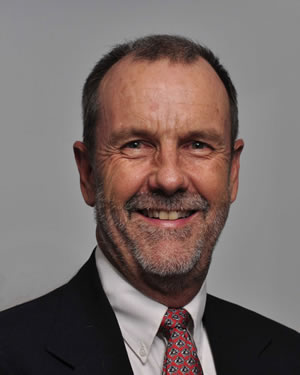
Bruce M. Thomson
Research Professor & Emeritus, UNM: Department of Civil, Construction and Environmental Engineering
bthomson@unm.edu UNM webpage
Bruce Thomson, Ph.D., P.E. is Research Professor and Professor Emeritus in the Department of Civil, Construction and Environmental Engineering at the University of New Mexico. Dr. Thomson served as a faculty member in the Department of Civil, Construction and Environmental Engineering at the University of New Mexico and retired after 35 years at the rank of Regents Professor of Civil Engineering. He was Director of the university’s Water Resources Program from 2006 to 2013. He retains a position at UNM as Research Professor and continues to work on externally funded research projects. He has a B.S. degree in Civil Engineering from the University of California at Davis, and M.S. and Ph.D. degrees in Environmental Science and Engineering from Rice University, Houston, TX.
Dr. Thomson’s research has focused on the chemistry and treatment of metals and metalloids in water, including arsenic, chromium, molybdenum, selenium, uranium and vanadium, water resources of the southwestern US, and treatment of contaminated surface and ground water. Dr. Thomson has published over 70 journal articles, several book chapters and papers in over 150 conference proceedings. His research has been sponsored by the National Science Foundation, Department of Energy, the Environmental Protection Agency, state and local agencies and a variety of research foundations and private companies. Dr. Thomson has served on many federal, state and local committees involved with management and protection of water resources. He has served as a member of National Water Resource Institute’s (NWRI) panel assisting the NMED developing technical guidance for direct potable reuse of treated wastewater and was recently appointed by the Governor of NM to the state’s Water Quality Control Commission (WQCC). He is an elected member and current Chair of the Board of Directors of the Albuquerque Metropolitan Arroyo Flood Control Authority (AMAFCA). Dr. Thomson is a licensed Professional Engineer in the State of New Mexico (PE License number 7131). He is among the last practicing engineers in the state who still knows how to use a slide rule.
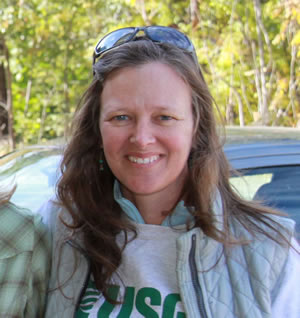
Anne C. Tillery
Surface Systems Specialist: USGS New Mexico Water Science Center
atillery@usgs.gov USGS webpage
Anne Tillery has been a hydrologist in the Investigations Section of the New Mexico Water Science Center since 2007 and is a member of the technical quality-assurance team for the center. She holds a Master of Science in Earth and Planetary Science and a Bachelor of Science in Geology. She has 20 years of experience in surface water and geomorphic processes of the southwest. Her research focuses on the hydrology, hydraulics, and geomorphology of flooding in desert ephemeral channels and of debris flows following wildfires. She is currently the project chief for the Flood Analysis, Flood Frequency, and Low-flow programs in New Mexico. She has conducted pre- and post- wildfire debris flow hazards assessments and documents postwildfire flooding and debris flows around New Mexico. She is currently on a regional team charged with realizing the USGS vision of integrated drought science in the Colorado River Basin. Ms. Tillery has published studies related to postwildfire flooding and erosion, desert ephemeral-channel flow, and Holocene climate change impacts on desert geomorphology in addition to maps of stream networks and ground water levels.



